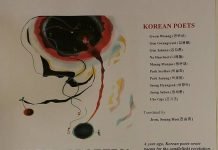 Matthew Lewis & Clara Kwon-Tatum
Matthew Lewis & Clara Kwon-Tatum
Please introduce yourself.
My name is Matthew Lewis. I hold a BA in Old English Literature with a Certificate of Medieval Studies and an MA in English Literature, and I have CELTA certification in teaching ESL. I spent several years teaching English in Korea, and have taught ESOL in the US. I am currently the Planning Director for a small Atlanta university, and I continue to teach English and ESL as and when needed.
How did you get involved with this project?
I was approached by Dr. Clara Kwon-Tatum about participating in this project last year. I was intrigued, since I have not had the opportunity to study much in the way of Korean poetry. The work is interesting, and allows me to explore a little more deeply into Korean culture, which I enjoy. I hope that our work is beneficial, and that others may come to appreciate this poetry by way of our translations.
What about Korean poems interested you?
I have spent a great deal of time studying Old English history and literature, much (indeed, almost all) of which is poetry, or at least poetic. Building a translation from Old English or Anglo-Saxon in modern English is a tricky task, but one that I think is worthwhile and fascinating. I particularly like the wordplay involved in making the translation hew as closely to the original as possible, without sounding mechanical. I find the same is true of translating Korean poetry. The themes and motifs often do not exist in English poetry, and finding creative ways to translate while staying true to the author’s original is not always easy, but is very rewarding when it works. Perhaps this project will give other Americans a little more insight into a culture that we do not really understand very well. Sharing literature and poetry between cultures can provide a level of understanding that simply reading a history cannot give.
Any thoughts while translating the poems?
I’d say the trickiest part of translating has been making motifs that may be obvious to Koreans accessible to an American audience. I am often torn between changing a word or idea, and thus impinging on authorial intent, or leaving it be and providing a footnote, which I find can take a reader out of the poetry. It seems to me that too much explanation can make readers feel like they are being patronized, but too little can give a work that spuriously inscrutable “Orientalism” (a term I dislike) which, even today, is a perception that many Westerners have of East Asia. I try to avoid this, but it can be difficult at times. Still the challenge it presents is a fascinating and rewarding one.
I really appreciate you participating in this project










